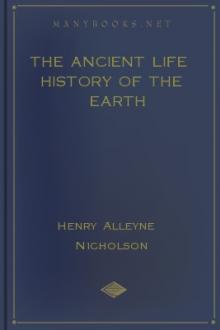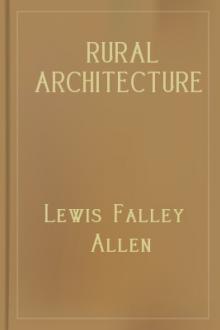Studies in Pessimism, Arthur Schopenhauer [best book clubs .TXT] 📗

- Author: Arthur Schopenhauer
Book online «Studies in Pessimism, Arthur Schopenhauer [best book clubs .TXT] 📗». Author Arthur Schopenhauer
*
Once, as I was botanizing under an oak, I found amongst a number of other plants of similar height one that was dark in color, with tightly closed leaves and a stalk that was very straight and stiff. When I touched it, it said to me in firm tones: Let me alone; I am not for your collection, like these plants to which Nature has given only a single year of life. I am a little oak .
So it is with a man whose influence is to last for hundreds of years. As a child, as a youth, often even as a full-grown man, nay, his whole life long, he goes about among his fellows, looking like them and seemingly as unimportant. But let him alone; he will not die. Time will come and bring those who know how to value him.
* * * * *
The man who goes up in a balloon does not feel as though he were ascending; he only sees the earth sinking deeper under him.
There is a mystery which only those will understand who feel the truth of it.
* * * * *
Your estimation of a man's size will be affected by the distance at which you stand from him, but in two entirely opposite ways according as it is his physical or his mental stature that you are considering. The one will seem smaller, the farther off you move; the other, greater.
* * * * *
Nature covers all her works with a varnish of beauty, like the tender bloom that is breathed, as it were, on the surface of a peach or a plum. Painters and poets lay themselves out to take off this varnish, to store it up, and give it us to be enjoyed at our leisure. We drink deep of this beauty long before we enter upon life itself; and when afterwards we come to see the works of Nature for ourselves, the varnish is gone: the artists have used it up and we have enjoyed it in advance. Thus it is that the world so often appears harsh and devoid of charm, nay, actually repulsive. It were better to leave us to discover the varnish for ourselves. This would mean that we should not enjoy it all at once and in large quantities; we should have no finished pictures, no perfect poems; but we should look at all things in that genial and pleasing light in which even now a child of Nature sometimes sees them - some one who has not anticipated his aesthetic pleasures by the help of art, or taken the charms of life too early.
* * * * *
The Cathedral in Mayence is so shut in by the houses that are built round about it, that there is no one spot from which you can see it as a whole. This is symbolic of everything great or beautiful in the world. It ought to exist for its own sake alone, but before very long it is misused to serve alien ends. People come from all directions wanting to find in it support and maintenance for themselves; they stand in the way and spoil its effect. To be sure, there is nothing surprising in this, for in a world of need and imperfection everything is seized upon which can be used to satisfy want. Nothing is exempt from this service, no, not even those very things which arise only when need and want are for a moment lost sight of - the beautiful and the true, sought for their own sakes.
This is especially illustrated and corroborated in the case of institutions - whether great or small, wealthy or poor, founded, no matter in what century or in what land, to maintain and advance human knowledge, and generally to afford help to those intellectual efforts which ennoble the race. Wherever these institutions may be, it is not long before people sneak up to them under the pretence of wishing to further those special ends, while they are really led on by the desire to secure the emoluments which have been left for their furtherance, and thus to satisfy certain coarse and brutal instincts of their own. Thus it is that we come to have so many charlatans in every branch of knowledge. The charlatan takes very different shapes according to circumstances; but at bottom he is a man who cares nothing about knowledge for its own sake, and only strives to gain the semblance of it that he may use it for his own personal ends, which are always selfish and material.
* * * * *
Every hero is a Samson. The strong man succumbs to the intrigues of the weak and the many; and if in the end he loses all patience he crushes both them and himself. Or he is like Gulliver at Lilliput, overwhelmed by an enormous number of little men.
* * * * *
A mother gave her children Aesop's fables to read, in the hope of educating and improving their minds; but they very soon brought the book back, and the eldest, wise beyond his years, delivered himself as follows: This is no book for us; it's much too childish and stupid. You can't make us believe that foxes and wolves and ravens are able to talk; we've got beyond stories of that kind !
In these young hopefuls you have the enlightened Rationalists of the future.
* * * * *
A number of porcupines huddled together for warmth on a cold day in winter; but, as they began to prick one another with their quills, they were obliged to disperse. However the cold drove them together again, when just the same thing happened. At last, after many turns of huddling and dispersing, they discovered that they would be best off by remaining at a little distance from one another. In the same way the need of society drives the human porcupines together, only to be mutually repelled by the many prickly and disagreeable qualities of their nature. The moderate distance which they at last discover to be the only tolerable condition of intercourse, is the code of politeness and fine manners; and those who transgress it are roughly told - in the English phrase - to keep their distance . By this arrangement the mutual need of warmth is only very moderately satisfied; but then people do not get pricked. A man who has some heat in himself prefers to remain outside, where he will neither prick other people nor get pricked himself.
Imprint
Once, as I was botanizing under an oak, I found amongst a number of other plants of similar height one that was dark in color, with tightly closed leaves and a stalk that was very straight and stiff. When I touched it, it said to me in firm tones: Let me alone; I am not for your collection, like these plants to which Nature has given only a single year of life. I am a little oak .
So it is with a man whose influence is to last for hundreds of years. As a child, as a youth, often even as a full-grown man, nay, his whole life long, he goes about among his fellows, looking like them and seemingly as unimportant. But let him alone; he will not die. Time will come and bring those who know how to value him.
* * * * *
The man who goes up in a balloon does not feel as though he were ascending; he only sees the earth sinking deeper under him.
There is a mystery which only those will understand who feel the truth of it.
* * * * *
Your estimation of a man's size will be affected by the distance at which you stand from him, but in two entirely opposite ways according as it is his physical or his mental stature that you are considering. The one will seem smaller, the farther off you move; the other, greater.
* * * * *
Nature covers all her works with a varnish of beauty, like the tender bloom that is breathed, as it were, on the surface of a peach or a plum. Painters and poets lay themselves out to take off this varnish, to store it up, and give it us to be enjoyed at our leisure. We drink deep of this beauty long before we enter upon life itself; and when afterwards we come to see the works of Nature for ourselves, the varnish is gone: the artists have used it up and we have enjoyed it in advance. Thus it is that the world so often appears harsh and devoid of charm, nay, actually repulsive. It were better to leave us to discover the varnish for ourselves. This would mean that we should not enjoy it all at once and in large quantities; we should have no finished pictures, no perfect poems; but we should look at all things in that genial and pleasing light in which even now a child of Nature sometimes sees them - some one who has not anticipated his aesthetic pleasures by the help of art, or taken the charms of life too early.
* * * * *
The Cathedral in Mayence is so shut in by the houses that are built round about it, that there is no one spot from which you can see it as a whole. This is symbolic of everything great or beautiful in the world. It ought to exist for its own sake alone, but before very long it is misused to serve alien ends. People come from all directions wanting to find in it support and maintenance for themselves; they stand in the way and spoil its effect. To be sure, there is nothing surprising in this, for in a world of need and imperfection everything is seized upon which can be used to satisfy want. Nothing is exempt from this service, no, not even those very things which arise only when need and want are for a moment lost sight of - the beautiful and the true, sought for their own sakes.
This is especially illustrated and corroborated in the case of institutions - whether great or small, wealthy or poor, founded, no matter in what century or in what land, to maintain and advance human knowledge, and generally to afford help to those intellectual efforts which ennoble the race. Wherever these institutions may be, it is not long before people sneak up to them under the pretence of wishing to further those special ends, while they are really led on by the desire to secure the emoluments which have been left for their furtherance, and thus to satisfy certain coarse and brutal instincts of their own. Thus it is that we come to have so many charlatans in every branch of knowledge. The charlatan takes very different shapes according to circumstances; but at bottom he is a man who cares nothing about knowledge for its own sake, and only strives to gain the semblance of it that he may use it for his own personal ends, which are always selfish and material.
* * * * *
Every hero is a Samson. The strong man succumbs to the intrigues of the weak and the many; and if in the end he loses all patience he crushes both them and himself. Or he is like Gulliver at Lilliput, overwhelmed by an enormous number of little men.
* * * * *
A mother gave her children Aesop's fables to read, in the hope of educating and improving their minds; but they very soon brought the book back, and the eldest, wise beyond his years, delivered himself as follows: This is no book for us; it's much too childish and stupid. You can't make us believe that foxes and wolves and ravens are able to talk; we've got beyond stories of that kind !
In these young hopefuls you have the enlightened Rationalists of the future.
* * * * *
A number of porcupines huddled together for warmth on a cold day in winter; but, as they began to prick one another with their quills, they were obliged to disperse. However the cold drove them together again, when just the same thing happened. At last, after many turns of huddling and dispersing, they discovered that they would be best off by remaining at a little distance from one another. In the same way the need of society drives the human porcupines together, only to be mutually repelled by the many prickly and disagreeable qualities of their nature. The moderate distance which they at last discover to be the only tolerable condition of intercourse, is the code of politeness and fine manners; and those who transgress it are roughly told - in the English phrase - to keep their distance . By this arrangement the mutual need of warmth is only very moderately satisfied; but then people do not get pricked. A man who has some heat in himself prefers to remain outside, where he will neither prick other people nor get pricked himself.
Imprint
Publication Date: 05-21-2008
All Rights Reserved
Free e-book «Studies in Pessimism, Arthur Schopenhauer [best book clubs .TXT] 📗» - read online now
Similar e-books:





Comments (0)